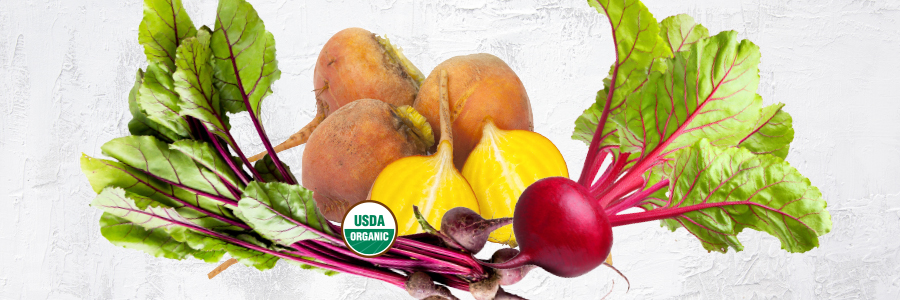


Sign-up for {N}power to get exclusive discounts, newsletters, members-only features, and more!

Humans’ romance with beets has been written through history, in shared feasts, admiring gazes falling on brilliant red and gold, delighting in their sweet earthy flavor, and nourished by their leaves and roots. From the Greeks and Romans to modern day urban gardens, it’s a love that has been cultivated by humans for centuries. During this month of love, be sure to add some of these gem-like vegetables to your menu—just make them organic!

The Romans were said to consume beets to treat constipation and fevers, and in the Middle Ages they were reportedly used for digestive ailments.1 Today they remain a staple of healthy eating around the world, beloved for their high concentration of nutrients, including antioxidants and nitrates. The nitrates are what make beets so heart healthy—our bodies convert nitrates into nitric oxide (NO), which supports cardiovascular health by relaxing blood vessels and promoting healthy blood pressure.2 Beets also support energy production and improve oxygenation, and studies have shown great benefits for athletes.3 And let’s not forget the greens! (Fun fact: beets were first cultivated for their leafy tops!) The leaves of beets contain higher amounts of certain nutrients than the ruby red root we typically eat, including iron and potassium, and vitamins A, C, and K.4
A steaming bowl of crimson and golden jewels with a sprinkle of caraway seeds, a dash of olive oil, and a hint of… heavy metals?! No, thank you! Root vegetables like beets are at the highest risk for accumulating heavy metals, including cadmium, mercury, and lead.5 Beets grow long taproots that reach deep into the soil to access nutrients, but when soil is contaminated from conventional agricultural practices, like using fertilizers containing cadmium, those metals can accumulate in the beetroot. These heavy metals can then put human health at risk—cadmium, for example, can build up in the kidneys and alter DNA repair processes.6 On the other hand, organic beets and beet products like juices and supplements have been shown to have lower levels of heavy metals—a clear choice for optimal health and getting the most out of these delicious roots.
Beets tend to be lower in pesticide residues, but this doesn’t mean pesticides aren’t used, nor does it put beets in the clear when it comes to their environmental impact and the importance of choosing organic. There are more than 45 pesticides used in beet farming, and 39 of those pesticides have been linked with chronic health impacts, including cancer.7 Beets depend on pollinators to grow, and 18 of those pesticides are toxic to honeybees and other pollinators. Organic standards protect pollinators who work tirelessly to keep crops and other plants growing and thriving by prohibiting the use of toxic synthetic pesticides. Organic farming also produces fruits and veggies that are more nutritious—when compared to conventionally grown beets, organic beets contained a “significantly” higher concentration of antioxidants.8 9
With all the amazing benefits beets offer, you want to get the most out of every beet you eat, and that means choosing organic, whether it be the root, greens, juice, or a powder supplement.



Sign-up for {N}power to get exclusive discounts, newsletters, members-only features, and more!